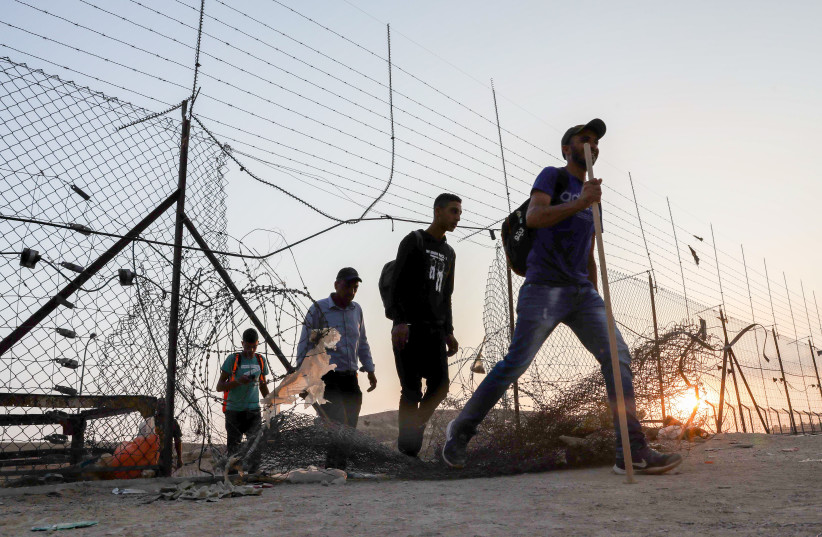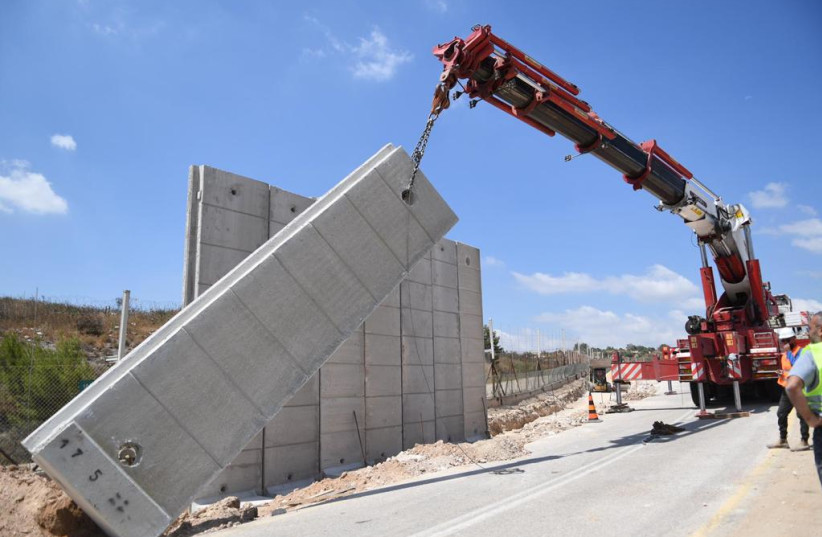In 2017, the IDF and Defense Ministry decided to abandon its 15-year and NIS 8.3 billion effort to continue to solidify security along the West Bank barrier and Prime Minister Benjamin Netanyahu let it happen, a State Comptroller report said on Tuesday.
State Comptroller Matanyahu Englman made one of his most hard-hitting accusations to date against the IDF and Netanyahu, especially in the context of the current wave of violence which many worry is spiralling out of control.
Although IDF sources have told the Jerusalem Post that during 2022, allocating large additional resources helped complete unfinished parts of the barrier and fix parts that the Palestinians had broken, all of this only started to kick in after the 2022 terror wave had taken hold.
Moreover, even IDF sources admit that the unfinished parts of the barrier will not be finished until late 2023 if not late 2024, leaving the country partially under-defended for the foreseeable future.
According to the report, the IDF and Defense Ministry’s 2017 decision to cease fixing parts of the barrier when they were vandalized or destroyed by Palestinians led to the barrier’s effectiveness plummeting from being 92% functional in 2018 to a mere 52% functional by the end of 2021.

In addition, the report said that the IDF drew down its security forces in the West Bank by 70% at the time.
The report said, “the significance was total abandonment of the barrier and loss of control of the area without presenting a different solution to prevent illegal crossing into Israeli territory.”
This led to around 1.4 million Palestinians breakthroughs of the West Bank barrier in 2021 with some periods of time reaching 6,000 illegal Palestinian breakthroughs per day.
Moreover, the report said that the IDF presented the problem of losing sufficient volumes of IDF forces in the area as well as a spike in Palestinians breaking through the barrier to the Defense Ministry and Prime Minister Benjamin Netanyahu from 2017 and onward.
Despite this, the report said that Netanyahu and his cabinet “did not hold hearings regarding how to improve the effectiveness of the barrier and related defensive border obstacles” until the killing of 11 Israelis by Palestinians in March and April 2022.
At that point, then-prime minister Naftali Bennett and his cabinet shifted gears, though they also had not dealt with the issue since taking power in mid-2021.
The Defense Ministry and IDF responded stating that the comptroller report statistics are incorrect even for part of the 2017-2022 era that they discuss, saying that for most of the West Bank areas, the barrier was 82% effective even before 2022.
There is an unclear part of the ministry’s response on this issue where it says 82% effective “except in areas where it was decided operationally not to fix breakthroughs.”
The ministry does not explain on the record what these areas were or why the decision was taken.
Comptroller sources said that the data all comes from the IDF and that the IDF was presented with a draft copy of the report in October 2022, and that it did not object to the data.

Further, these sources flagged that Aviv Kohavi, who was IDF chief until this past January, had stated in his own May 2022 summaries that even after improvements in March-April 2022, the West Bank barrier security was inadequate.
The Jerusalem Post has learned that the state comptroller’s office would say that part of the IDF decision to look the other way regarding breakthroughs in certain parts of the West Bank barrier was based on an understanding that traffic jams at the border-crossings was out of control.
According to this view, there was some kind of an Israeli interest in Palestinians working in Israel so as to improve economic stability and discourage terrorism and if the border crossings were too slow, then allowing some “innocent” breakthroughs for work purposes made sense.
In contrast, the Post has learned that the IDF view would be that terrorism emanating from the West Bank was down in 2017, statistics showed that most Palestinians crossing the border were seeking work and that more IDF forces were needed on other more dangerous fronts.
IDF, Defense Ministry
In addition, the IDF and the Defense Ministry added that since March-April 2022 and the IDF’s initiation of Operation Breaking the Waves, the whole situation has been radically improved, restoring security fully to the area.
They would say that near the start of the terror wave in March 2022, there was a huge increase in IDF reinforcements along the barrier, as well as a jump in the supply of stationary surveillance technology, surveillance drones and lookout posts.
The Post understands that the IDF view would be that this led to a significant drop in illegal crossings of Palestinians even before the many West Bank barrier holes were fixed.
By mid-summer 2022, the IDF would say that essentially all of the holes were fixed and being refixed at a rapid rate whenever any Palestinians tried to break through.
Moreover, the IDF view is that the enormous increased commitment by the IDF has led to a significant drop in criminal activities within the Green Line, which used to stem from some illegal Palestinians' actions on the side of their work activities.
In addition, the IDF would say that there has been a conceptual paradigm shift by Palestinians who have noticed not only the new levels of security, but a much larger number of them being arrested, which has led to a shift to crossing properly at the official border-crossings.
The comptroller report acknowledged that NIS 2.4 billion additional funds was allocated in 2022 to restore the barrier and security generally in the West Bank border areas, but said that this would be inadequate absent a comprehensive strategy, including more and permanent surveillance troops and lookout stations.
As of Tuesday afternoon, neither current Prime minister Netanyahu nor former prime minister Bennett had provided responses.